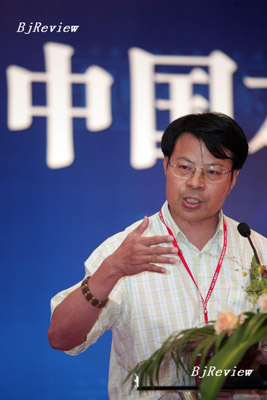
China’s redhot stock market is a place to harvest not only wealth, but also fame. Wang Zhongming, previously little known head of research with China’s state-owned assets watchdog, became a cult hero to stock market players overnight when he challenged mainstream opinion on May 19, announcing that “national stock fever” is to be welcomed and not feared.
“It symbolizes a new era in which growing numbers of people will create wealth,” Reuters quoted Wang as saying.
Before Wang made the comment, the media was overwhelmed by warnings that the flood of retail investors is taking the already stretched stock market bubble even closer to bursting point.
Going totally against the opinion of jumpy market analysts, Wang suggested less administrative interference during the current stock market boom. “There is no need to worry. China’s bullish market reflects its economic prosperity. And if it is really overheated, there should be enough data-evidence to prove this,” he said.
The benchmark CSI 300 Index, which tracks yuan-denominated A shares listed on China’s two exchanges, has jumped about 90 percent so far this year after more than doubling in 2006 to reach 3938.95 on May 23. According to official statistics, the country now has nearly 100 million brokerage accounts, or 33 percent more than a year earlier.
But Wang regards the bull market as a test of the government’s capacity to manipulate it and to help avoid risks. An overcautious attitude will restrain more investors and mislead policymakers, he said.
Given the continuous bullish run, China’s central bank has raised interest rates and banks’ deposit reserve ratio to curb excessive liquidity and speculation.
However, Wang believes levels seen in the stock market reflected confidence in China’s economic development rather than irrational behavior or market manipulation.
In an effort to build up investor confidence, particularly institutional investors, a package of measures have been adopted by China’s securities watchdog, such as increasing new issues, to balance supply and demand. Retail investors have also been warned to be responsible for their assets investment and management.
“The price-to-earnings ratio of the mainland market is staggering, reaching 50-60 fold…I think people should be more cautious about their investment, if it collapses, it will definitely affect the
H-share of Hong Kong.”
Li Ka-shing, Chairman of Cheung Kong (Holdings) Ltd. in an interview with Wen Hui Po, a Hong Kong-based daily
“The government should make more adjustments between supply and demand, in which supply should be emphasized to channel excessive influx out.”
Professor Yang Chaojun, head of the Finance and Securities Institute of
Shanghai Jiao Tong University
“Corporate America has been here for decades, or at least 15-20 years, and we’ve been behind the curve...We have to engage, we have no choice.”
Greg Tarpinian, Executive Director of Change to Win, who, along other leaders of the second largest U.S. coalition of unions, kicked off an
ice-breaking China visit on May 18, ending a decades-old boycott of China unions by American labor groups
“Over the past 10 yearsthere have been some bumpy moments-politically andeconomically-but some of the more dire predictions I remember so
vividly from 1997 have not come true. ‘One country, two systems’
has worked.”
British Foreign Secretary Margaret Beckett, in a May 21 speech at the British Chamber of Commerce during her visit to Hong Kong
“Every hour, three species disappear. Every day, up to 150 species are lost. Every year, between 18,000 and 55,000 species become extinct.”
Ahmed Djoghlaf, head of the UN Conventionon Biological Diversity, blaming human activities for causing the greatest wave of extinction since the disappearance of the dinosaurs 65 million years ago, on May 22, International Day for Biological Diversity
“On top of the money we already pay for U.S. forces in Japan, to pay further expenditures is unheard of anywhere in the world and that
will not gain the understanding of the people of Japan, either.”
Shokichi Kina, an opposition lawmaker from the Democratic Party, before Japan’s lower house of parliament passed a law on May 23 to fund the reorganization of U.S. forces in Japan and help move thousands of Marines from the country’s south to the U.S. territory of Guam
“We now have endorsed the concept of preemptive war where
we go to war with another nation militarily, even though our own
security is not directly threatened, if we want to change the regime there, or if we fear that some time in the future our security might be endangered.”
Former U.S. President Jimmy Carter, in a telephone interview with the Arkansas
Democrat-Gazette released on May 19 | 